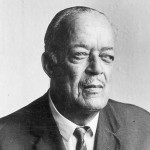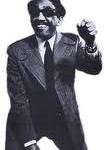Laurel Aitken has the distinction of being the first Jamaican in popular music to expose the island’s music to the outside world. Aitken’s exploits in the United Kingdom (UK) forged a new wave of musical transformations that changed the lives of Britons and West Indian expatriates, domiciled in a land they call ‘greener pastures’. Like them, Aitken migrated to the UK in 1960 in search of a better way of life. He took with him a rich legacy of his ska and boogie hits made in Jamaica that eventually became the foundation on which he built a huge following and an illustrious career there.
Born in Cuba in 1927 to a Jamaican father and a Cuban mother, Aitken, his siblings and his parents migrated to Jamaica in 1938 when Aitken was 11 years old. He grew up listening to songs by Nat King Cole and the boogie-woogie styles of Louis Jordan, before entering and winning on the Vere Johns Opportunity Hour talent show. The musically inclined teenager soon found himself dancing and singing in some of Kingston’s popular nightclubs, and performing calypsos for the Jamaica Tourist Board as tourists alighted from ships in the Kingston Harbour.

In the meantime, Aitken was developing some formidable writing skills that enabled him to compose a number of songs in the calypso, boogie and revivalist styles. Between 1958 and 1960, he recorded in Jamaica in the calypso, revivalist and pre-ska shuffle mode for various producers. Accompanied by The Boogie Cats, Aitken’s calypso – Baba Kill Me Goat – was very popular at the time, while his revivalist recording of Judgement Day had questions for evildoers:
“What you gonna do on the judgement day?
You cannot rock and roll on that day.
All you gotta do is kneel and pray.”
When the first Jamaican record charts were issued in 1959, Aitken created history by becoming the first Jamaican artist to place a recording on that roster. Previously, all other entries were foreign songs. That recording, titled Boogie Rock, debuted in the top 20 and a couple weeks later it moved into the top 10. Other Jamaican recordings to have charted in this initial stage included Dumplins by Byron Lee and The Dragonaires, We’re Gonna Love by Wilfred ‘Jackie’ Edwards, Oh Mannie Oh by Higgs and Wilson, and Please Let Me Go by Owen Gray.
Laurel Aitken, whose brother was the famed guitarist Bobby Aitken, also continued to make the charts with Come Back Jeannie, Honey Girl, Boogie in My Bones, andLittle Sheila.

REAPING RICH REWARDS
The last two recordings, which were A and B sides of the same record, were historic:Boogie in My Bones became the first Jamaican recording to hit the number one spot on the Jamaican charts, while Little Sheila (released in 1958) was the first single to be released and distributed abroad on a new up-start label called Island Records, founded by the Jamaican-Englishman Chris Blackwell. Aitken thus became the springboard on which Blackwell built his career as a record producer. Little Sheila also reached number one and spent some 11 weeks there, while both recordings were on the charts for nearly a year. Other successful Rhythm and Blues-oriented recordings released by Aitken during this period included Low Down Dirty Girl and More Whisky, for producer Duke Reid.
After moving to Brixton, England, in 1960, Aitken found the Jamaican community there quite appreciative of his recordings, like Sixty Days and Sixty Nights, Mary Lee andLucille for the Melodisc label, and others on its subsidiary – Blue Beat label – which was designed exclusively for the distribution of Jamaican recordings in the United Kingdom.

Under contract with some Jamaican record producers, Melodisc Records was given special permission to distribute Jamaican recordings in the UK. Aitken was one of the first Jamaican artists to take advantage of that arrangement, reaping rich rewards with a number of English-made ska recordings that touched millions, not only in the UK but across Europe.
The arrangement helped to structure Jamaican ska music in the UK and enhance its popularity, while giving the music its name – Blue Beat. The label came into existence after Melodisc issued Aitken’s single Lonesome Lover. The response was so great that it prompted Emile Shalit, owner of Melodisc Records, to found a label devoted specifically to Jamaican recordings. A bouncy ballad, Lonesome Lover, was a song of enormous proportions which found Aitken emotionally charged as he sang:

“I’m just a lonesome lover
looking someone to love me,
hoping that when I find that someone,
I’ll never be lonesome no more.”
The Blue Beat label also released several of Aitken’s early recordings that he did in Jamaica.
Back in Jamaica for a short while in 1963, Aitken recorded some cuts for producer Duke Reid that included Zion and Weary Wanderer. A highly spiritual man, it was said many of his recordings leaned in that direction – Roll Jordan,Mighty Redeemer, Brother David and Judgement Day being a few. But if you should ask any Jamaican of that era which Laurel Aitken song was his/her favorite, nine out of 10 would tell you I Remember. The correct title of the song,You Left Me Standing, meant little to them, as they danced and pranced to an infectious R&B rhythm and Aitken’s vocals:

“I remember that night I met you when we said that we would never part but now you’re leaving, taking another, leaving me standing with a broken heart.”
Back in England during the late 1960’s and early 1970’s, Aitken, dubbed ‘The Godfather of Ska’, with close to 130 singles and 30-odd albums, moved to other labels and expanded his style to include rocksteady and reggae. He continued to tour the UK and Europe extensively during the 1970’s, spreading Jamaica’s music. As the 1980’s dawned, Aitken confined himself to occasional club dates. His only pop hit, Rudi Got Married, came in 1981, and by the end of the decade he recorded with a group of ska revivalists. Virtually retired by the 1990’s, Aitken still toured occasionally. He died in Leicester, England, on July 17, 2005 at age 78, after suffering a heart attack.



You must log in to post a comment.